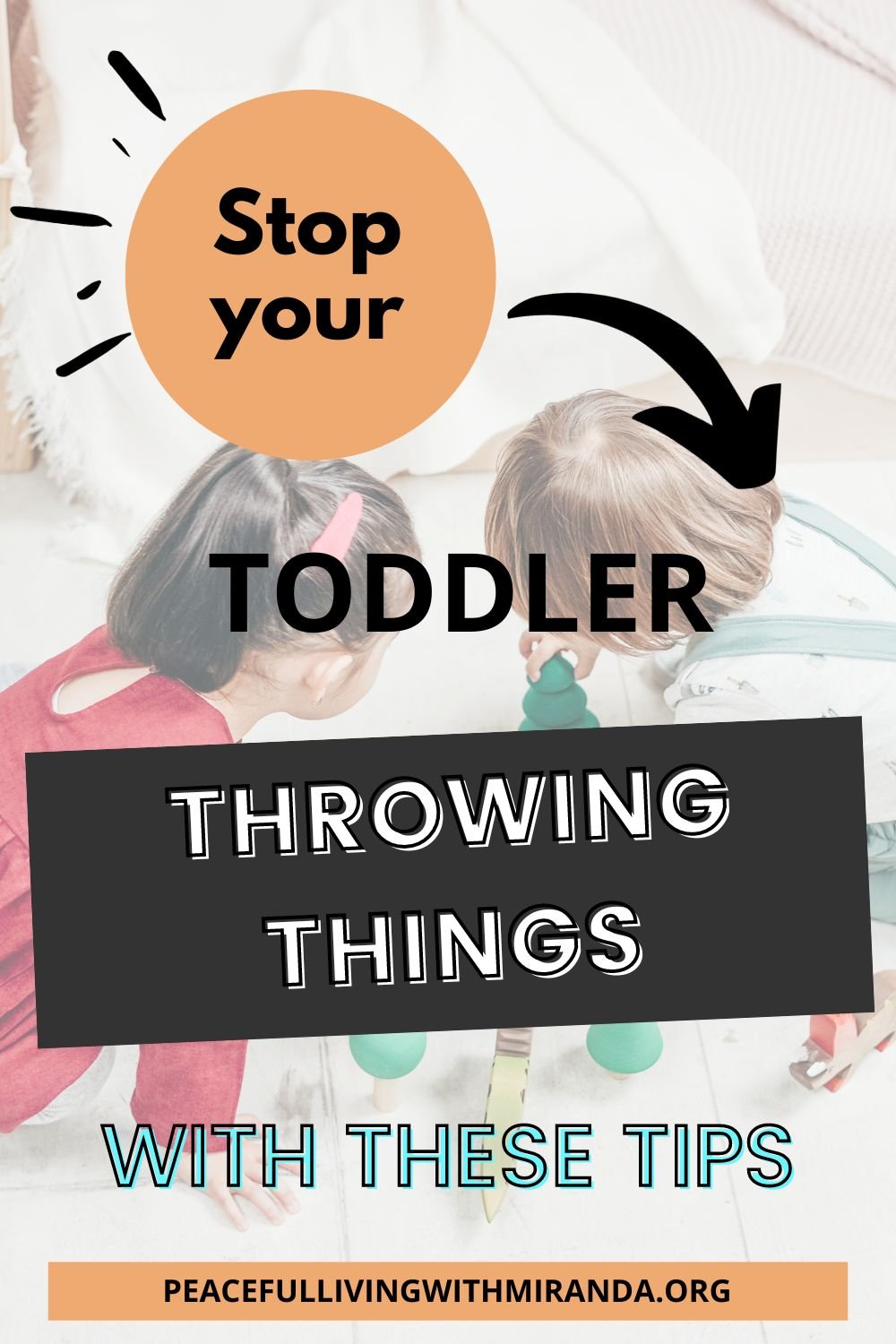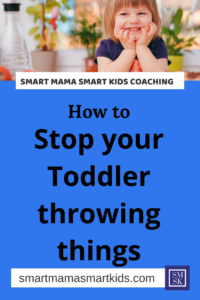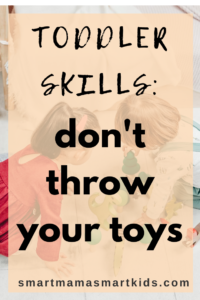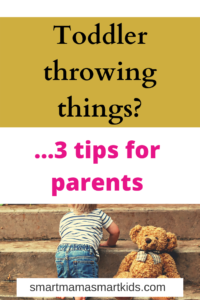3 ways to Stop your 2 year old throwing things
Many parents have trouble trying to stop their 2 year old throwing things, including toys.
If you have a toddler who has developed this annoying and repetitive habit, this article will give you some strategies for helping your child learn that this is not what they should be doing!
What you will read in this post:
What you need to know about your toddler's development-and that it's normal;
My favourite 3 ways to stop a 2 year old throwing things all the time!
Smart Mama Smart Kids: It can be hard to implement toddler behaviour management as a first time mum. Stop your two year old throwing toys or other things using these positive parenting techniques! #parenting #toddlerstrategies #behaviourmanagement #toddleractivities
Toddler Development and what you need to know
**Disclaimer: This post contains affiliate links, which may bring me some commission, at no cost to you.**
2 year old children are in an intense stage of development. Their brains have grown an amazing amount since birth, and they are constantly learning.
2 year olds have just entered Piaget's preoperational stage, when they start to understand symbolic thought.
For instance, learning that a picture of a cow is signifying 'a cow'. This is when gorgeous flash cards are really useful, because you can match, or talk about the different animals or forms on them.
When a child is 2, they also start using this type of thought to begin to play pretend and role play. They copy others, too-which is why sometimes they have seen another child throwing things and decide this is a fun thing to try!
So how does this help me stop my 2 year old throwing things?
Firstly, it's worth knowing that overall, this stage is completely normal.
No matter how annoying it is, the 'throwing things' phase of toddlerhood is one which many (in fact most) parents encounter.
You aren't alone.
However, small children will not learn to stop their unwanted behaviour unless we show them we don't want them behaviour present.
There are then different schools of thought and behaviour management practice which parents usually follow at this point.
Punishment ('No, you will not throw things!' Smack, or berating the child.)
Ignoring (Pretends it didn't happen in the hope it doesn't happen again.)
Discipline (Uses calm, assertive tone and positive actions to ensure child realises this is not appropriate and will not be tolerated if it happens again.)
If you're familiar with my ethos of calm, connected and loving parenting here at Smart Mama Smart Kids, you will realise that the third option is my choice every time!
I do need to say, though, that sometimes ignoring the behaviour can work short-term-especially if it's the first time, or they are doing it for attention.
Use these 3 tips to stop your 2 year old throwing things!
1: Know the signs.
Observing a child is key to stop your 2 year old throwing things.
Part of being a proactive parent is about watching your child so you can help them succeed. In this case, success means not being told off, and successfully making a better choice.
Small children need our help to make good choices, so they know how to make good choices themselves as they grow.
If you see your child acting in a certain way, can see their emotions escalating or read their behaviour, you can get in there quickly to help them make a better decision!
2: Redirect your child.
Redirecting your child is like distraction, but it's a word for distracting your child and then moving them on with an active purpose.
Take this scenario:
Your child wants to use the drumsticks a friend is using during Music class. When he is told they aren't for him to use at the moment, he picks up another instrument and goes to throw it at his friend. You quickly stop your child, but he is intent on getting those drumsticks!
You can:
a) Remove your child from the situation
b) Ask the other child to give up his drumsticks
c) Totally ignore the consistent efforts of your child and the repercussions this has on the rest of the group,
d) Tell them off loudly...
https://youtu.be/CmC2KXIWBaw
Don't forget to jump onto my Youtube Channel and subscribe!
Or you can try my redirection strategy.
Take your child onto your knee or move him to where he has to listen to you (even if he is laying on the ground or carrying on), and say:
"You can't have the drumsticks yet, because Billy isn't finished with them. Maybe you can have a turn in a minute! While we wait, how about you and I grab that tambourine over there and you can show me how you play it along with this song? I bet you're great at it. Can you show me while we wait?"
If your child calms down and complies, well done! Go with it-and make sure they get a turn when the other child has finished.
If they are being stubborn, sit with them a little away from the group, quietly letting them have their moment (make sure it's not interfering with the other children's experience, even noise-wise). Then try the redirect strategy again-possibly with a different distraction.
Keep the mood light, redirect their attention and give yourself an imaginary high-five.
You just redirected your child and taught them some emotional intelligence skills at the SAME time. Congratulations!
BTW…Need some simple info + activities to ‘get’ your kids’ emotions?
-4 simple modules
-Mum and child activities
-Mum information session
-SO simple and raved about by previous attendees
The Emotionally Equipped Child, here as a self-paced ecourse on Udemy now
Using even just this strategy, you are able to start to teach your child that playtime and social interaction runs much more smoothly-and is more enjoyable for everyone, especially themselves- when they do not throw things.
It also shows them that you are the one in charge here, and that even if you are in charge, you will try to keep your word by making sure you get them a turn with those drumsticks when they are calm.
3: Give them the language or tools they need.
Giving your child the right vocabulary is extremely important so that they can then learn how to use it.
For instance, if you teach your child to say 'all done' when they're finished with their dinner, you are creating independence in the child.
However, this also helps immensely as parents too, because your child can let you know when they’re finished!
(Then you can get in quickly and grab their plate from them before they throw it!)
You can give your child a phrase to say when they want your attention, or when they don’t want to play with a toy any more, or when they are getting frustrated.
It’s up to us as parents to organise our child's vocabulary and give them thinking strategies, because early in their life they can’t organise it themselves.
For the drumstick scenario above, you could say to your child:
"If you want to use those drumsticks, you could say to Billy: 'Billy, can I have a turn when you're finished, please?'"
Even if they can't say it, your 2 year old can definitely understand you and the language you are using.
Demonstrating what your child could say in a situation they struggle in gives them a way to communicate with words instead of their body.
Think about what you actually want for your child and his development.
Do you want your child to be even thinking about throwing things?
Do we want this thought to even cross their mind?
Do we want to have to be consistently telling them off or dealing with that attitude when they're older?
Do we want other children, adults and ourselves to feel unsafe around our child in the long run?
If your answer, like mine, is a resounding NO to each of these questions, you need to stop your 2 year old throwing things as soon as possible.
By using the tips I'm sharing here, you can do this using positive parenting techniques as much as possible.
Nobody is perfect-we all have those moments when we shout at our children, (as much as we try not to) so if you're down on yourself, cut yourself a break!
In fact, I had such a breakthrough with my own and my clients’ guilt-tripping headspace (that God totally doesn’t want for us, IMO), that I wrote a ebook about it - Stop Mum Guilt: How to Stop that Ever-Present Guilt from Ruining your Mental Health - now available on Kindle!
No only do you want to stop your 2 year old throwing things, you want to make every effort for this not to be even part of their mental process.
Many parents seem to feel that this is a ‘natural’ part of their child growing up, and that they are going through a ‘phase’. While this is true, if we don’t actually implement some learning and boundaries as they go through the phase, they learn that throwing things is an acceptable behaviour - and this is when it becomes problematic.
In other words, understand that this is a stage, that they need us to be aware of this - but also, realise that what you are teaching them now is some of the mental habit and building blocks for life. It’s so important - but also not something to get anxious about, either.
To conclude:
Know the signs
Redirect your child
Give them the language or tools they need to communicate
If you can get in early, redirect and give your child the language and tools they need, and we may not even need to mention that they have thrown things-because it hasn't happened.
This means you don't have to tell your child off-but you do need to be a bit proactive and aware of what is going on with your child.
It can literally not even register for them, and you can effectively start to remove the habit of throwing things from your child every day life.
Do you have trouble managing to stop your 2 year old throwing things?
Comment below with how you managed to stop it... or did you?
You might like to read or save these blog posts for later:
Angry Toddlers: Giving your Toddler Emotional Development Skills
10 Journaling Questions to Ask Yourself for Deeper Self Discovery
How To Stop Feeling like a Failure as a Parent
Save for later on Pinterest!
Need some peace …. less overwhelm…and/or a few strategies?
Miranda is a teacher-turned stress management and emotional wellbeing coach, including spiritual coach for Christian women, for mums who are finding life overwhelming and stressful. She also authors wellbeing books such as Stop Mum Guilt and fantasy novels, as well as creates physical journals and products for women. If you feel overwhelmed, or are sick and tired of feeling that horrible guilt you carry around in your chest for ‘not doing everything well enough’, grab your 30% off call here as a new client!
Peaceful Living with Miranda: It can be hard to implement toddler behaviour management as a first time mum. Stop your two year old throwing toys or other things using these positive parenting techniques! #parenting #toddlerstrategies #behaviourmanagement #toddleractivities
Peaceful Living with Miranda: It can be hard to implement toddler behaviour management as a first time mum. Stop your two year old throwing toys or other things using these positive parenting techniques! #parenting #toddlerstrategies #behaviourmanagement #toddleractivities
Peaceful Living with Miranda: It can be hard to implement toddler behaviour management as a first time mum. Stop your two year old throwing toys or other things using these positive parenting techniques! #parenting #toddlerstrategies #behaviourmanagement #toddleractivities
Smart Mama Smart Kids: It can be hard to implement toddler behaviour management as a first time mum. Stop your two year old throwing toys or other things using these positive parenting techniques! #parenting #toddlerstrategies #behaviourmanagement #toddleractivities












